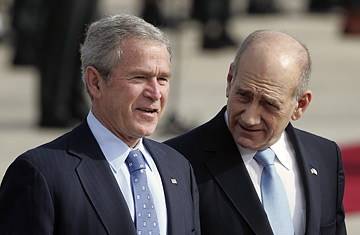
Israeli President Ehud Olmert greets U.S. President George W. Bush at Tel Aviv's Ben Gurion International Airport
When George W. Bush last visited Israel — as Texas governor, back in 1998 — he was taken on a helicopter ride by then Prime Minister Ariel Sharon. They soared over Jerusalem's ancient rooftops and across to the stony, terraced hills of the Palestinian West Bank. On Thursday, when Bush boards a U.S. Chinook helicopter bound for a meeting with the Palestinian President Mahmoud Abbas in Ramallah, he will traverse much of the same ground. During his chopper ride, however, Bush will glimpse a changed landscape — and witness the growing obstacles to peace.
Bush will see that a hundred new, illegal Jewish outposts have mushroomed on rocky hilltops inside the Palestinian territories; some are no larger than a few trailers circled defensively inside barbed wire, while others are fortified towns of neatly rowed houses with red tiled roofs. Extremist settlers flaunted their disdain for Bush and Israeli Prime Minister Ehud Olmert on Wednesday by colonizing two more hilltops on Palestinian land. Bush will also see a grotesque new feature: a 26-ft.-high concrete wall that snakes through the hills for miles. Built by the Israelis to keep out suicide bombers, this security barrier has cut deep inside Palestinian territory and has been condemned by Palestinians and international jurists. At a joint press conference with Olmert on Wednesday, Bush said that illegal Jewish outposts in the West Bank "have to go."
That won't be easy, as Bush will soon find out. The President will hear from Olmert how difficult it will be for his wobbly coalition government to take the politically explosive step of evacuating Jewish settlers from the Palestinian territories (Olmert's popularity ratings are even lower than Bush's). Many religious Israelis consider the West Bank to be part of ancient Judea and Samaria, and therefore, they say, it belongs to Israel and the Jews. The last time that Israeli police tried to clear out an outpost was at Amona in 2006, and it led to clashes that left more 200 people injured; since then, Israeli authorities are wary of provoking the religious Zionists who oppose the evacuations.
Meanwhile, Abbas will bend Bush's ear the other way, claiming that no peace accord is possible unless the settlements are dismantled and the wall torn down. Bush alone among U.S. Presidents has said that any future agreement should be based on "facts on the ground," given that more than 250,000 Israelis now live on land that Israel seized from Jordan in the 1967 war and is now claimed as part of a future Palestinian state.
Israel drew rare criticism from U.S. Secretary of State Condoleezza Rice soon after the Annapolis peace summit in November when Olmert's government authorized the extension of a controversial Jewish settlement known as Har Homa, built on confiscated Palestinian land near Bethlehem. Coming so soon after Annapolis, this also enraged the Palestinians. Meeting with Olmert on Dec. 27, Abbas warned that unless Israel froze building on the settlements, the Palestinians would break off peace talks.
Olmert reassured Abbas that under the terms of Bush's peace "road map," Israel would not confiscate more land or allow the construction of more settlements in the West Bank. Olmert also countered that Abbas had failed to live up to the Palestinian end of the road map, since he had failed to halt militants from attacking Israel.
Bush may be treated as a champion in Israel, but Palestinians are even more skeptical about him. As one Palestinian cabinet minister told TIME: "Nothing we've seen makes us think that Bush, during the last year he is in power, will start pushing the Israelis more forcefully. Bush is only here to talk about Iran." Abbas's security guards arrested more than 300 militants in an attempt to scotch any protests during Bush's short trip on Thursday to Ramallah.
But in the Palestinian territory of Gaza, which is in the hands of the Islamic militant group Hamas and beyond Abbas' control, about 20,000 Palestinians protested against Bush's trip, calling him a "vampire" sucking Muslim blood. Says Hamas official Mahmoud al-Zahar, "In his first words, Bush talked about Israel, its security, its democracy and the right of America and Israel to defend themselves. He did not talk about the [Israeli] settlements or the assaults against our people." It's a tall order for Bush, in the declining days of his presidency, to achieve peace when Israelis and Palestinians are divided, but also when Palestinians are divided among themselves. With reporting by Jamil Hamad/Bethlehem and Aaron J. Klein/Jerusalem
